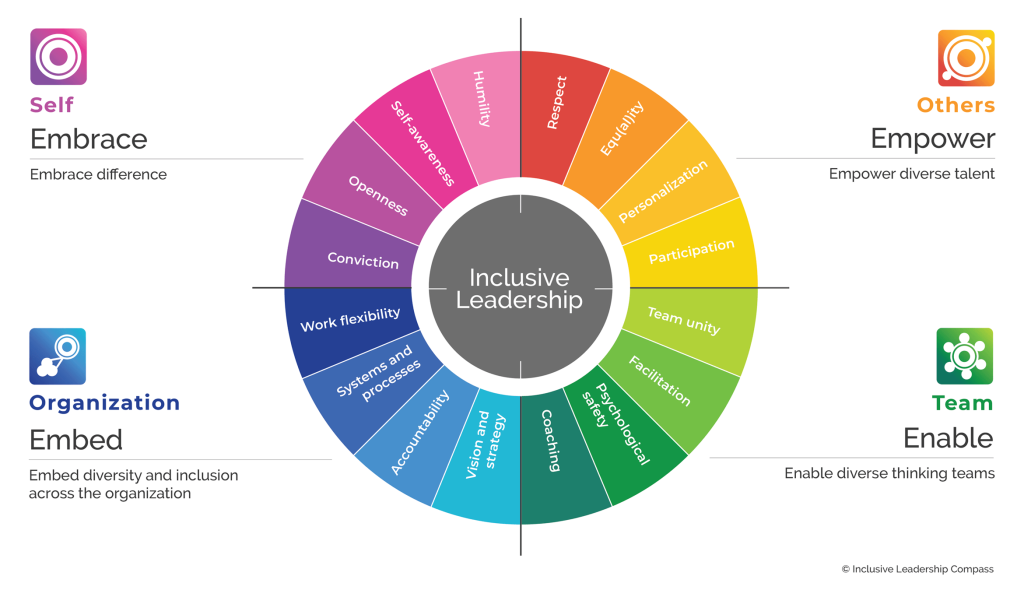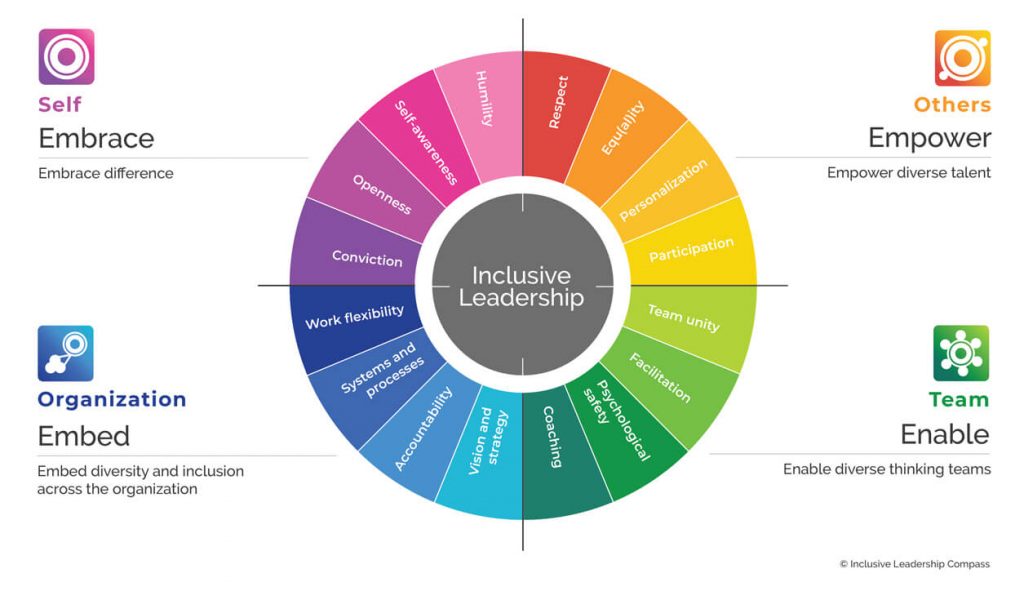Defining Inclusive Leadership – the ILC framework™
Our assessment and development tools are grounded in the Inclusive Leadership Compass framework™ which defines what highly inclusive leaders do.
Defining Inclusive Leadership – the ILC framework™
Inclusive leadership stands apart from other leadership approaches through its focus on behaviors that promote fairness, foster a sense of belonging and harness the power of difference to drive value creation.
Being able to lead inclusively sits at the heart of great leadership more broadly. However, most traditional leadership models don’t address what is required of leaders to build inclusive teams and organizations.
Accordingly, a crucial first step in developing inclusive capability is the implementation of a comprehensive and purpose-built framework to:
- Create a shared understanding and universal language at all levels.
- Enable accurate assessment and a clear roadmap for growth.
The Inclusive Leadership Compass framework is a validated, research-based model that operates at multiple levels and resonates strongly with leaders globally.
More specifically, our work shows that inclusive leaders exhibit four practices that span the distinct but reinforcing dimensions of Self, Others, Team and Organization. Mapped to these four practices are 16 Focus Areas and their underlying behaviors, which combine to influence inclusive leadership impact. Each of these practices are described in more detail below.

Embrace difference (Self)
The path to inclusive leadership starts with the leader themselves – the personal values, beliefs and attributes that influence their motivation and ability to behave inclusively in an authentic and sustained way.
These include strong egalitarian views and a belief in the value of difference, along with a willingness to subordinate their self-interest for the benefit of others where required. They also include personal attributes such as an openness to different people, ideas and change more broadly; a high degree of self-awareness enabling adaptation and self-regulation; and humility, with their preparedness to be vulnerable promoting connectivity, learning and growth.

Empower diverse talent (Others)
The mounting expectation towards a “more human kind of leadership” is deeply rooted in how inclusive leaders relate with others at an interpersonal level.
In essence, inclusive leaders treat people with dignity and respect – regardless of their differences – and exert considerable effort to self-regulate their own biases and treat others fairly. They view their people through a very human lens, understanding their individuality and demonstrating empathy and genuine concern for their well-being.
Driven by the goal to help people thrive, inclusive leaders proactively throw their support behind diverse talent, clearing or creating new pathways to success. Similarly, they encourage autonomy and delegate decision making authority to people, balancing this with their availability for consultation on problems when the need arises.

Enable diverse thinking teams (Teams)
Inclusive leadership is often thought of through an individual lens and with respect to equality and inclusion of diverse employees. As we describe above, this is a critical dimension. However, with the shift towards teams and the value inherent in harnessing their collective intelligence, a focus on leading diverse groups is also important.
Inclusive leaders recognize this and give attention to inspiring a sense of shared purpose among team members. They also lean into their personal attributes of humility and openness to create an environment of psychological safety where members feel safe to speak up without fear of negative consequences. Inclusive leaders are skilled facilitators enabling the constructive exchange of different ideas. They manage dominant voices and encourage quieter ones; coaxing creative abrasion while avoiding unproductive conflicts.
Understanding their role as coach and the dynamic nature of leadership itself, inclusive leaders also support team members in becoming more inclusive themselves. For example, they set clear standards of acceptable behavior, create opportunity for dialogue about differences and facilitate capability development with respect to inclusion.

Embed diversity and inclusion across the organization (Organization)
To unlock its full potential, diversity and inclusion must run through the core of the organization, with business systems aligned to reinforce behaviors and enable the sustained cultural shifts required.
Knowing this, inclusive leaders step up and use their power to challenge the status quo, influencing the adaptation of systems and structures that reinforce the centrality of diversity and inclusion to the organization’s purpose and business strategy. For example, they articulate a compelling vision, emphasizing inclusion as a fundamental organizational value. Similarly, they integrate diversity and inclusion into business reporting and accountability measures, and work to ensure these aspects are important considerations in talent-related processes. In addition, inclusive leaders are visible advocates for flexibility across the organization.



